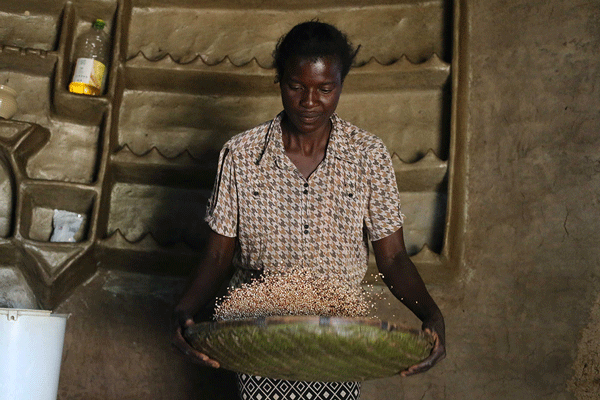
AFTER a series of seasonal climatic shocks and changes, women have been forced to bear the brunt.
BY TAFADZWA UFUMELI

But for Rutendo Gusinyu (21), the story is different, as she has managed to create a new narrative, as her participation in the small grain production project has brought positive changes.
Following her participation in a small grain production programme sponsored by World Food Programme (WFP) and the Food and Agricultural Organisation (FAO), Gusinyu was able to produce a healthy crop of sorghum on half a hectare piece of land close to her family homestead.

The last born in a family of five, she was among the most successful of the beneficiaries and is now able to sustain her family throughout the lean season.
“I was interested in this initiative because we have been affected by periodical climate shocks. My father has also equipped me with a strong background of farming since I was a child,” Gusinyu said.
She said the small grain will be used for home consumption, with the surplus channelled to feed their livestock.

“I am urging all young people to embark on sustainable farming in order to earn a living. Although I am a young girl and inexperienced in agriculture, but I have done it,” she said.
- Chamisa under fire over US$120K donation
- Mavhunga puts DeMbare into Chibuku quarterfinals
- Pension funds bet on Cabora Bassa oilfields
- Councils defy govt fire tender directive
Keep Reading
Women’s participation in farming in Mudzi and Rushinga district is increasing, as statistics from the assessment programme by Agritex showed that women were producing more than their male counterparts.
Of the 184 lead farmers in Rushinga District visited during the assessment, 106 were women, who planted 55,8 hectares of land out of the total of 95,3 hectares, while in Mudzi 49 out of 114 lead farmers were women.

Despite the effects of climate change, shortage of inputs like seed, fertiliser, fuel, machinery and implements also affected productivity. Through the intervention of WFP in partnership, with the government farmers were taught good agriculture practices.
“I am expecting to get a profit after value adding my produce,” Gusinyu said.
After undergoing the WFP training, I have discovered that farming is not just subsistence, but commercial”

AgriSeeds marketing director, Ivan Craig said, “We are quite happy with the progress so far in Mudzi and Rushinga districts, however, there is need to have food fairs and food shows as a way of promoting the small grains.”
Empowering women is key to achieving zero hunger in all WFP activities that include health and nutrition, lean season assistance, productive assets creation and small grains production which Rutendo has benefited from.

Christine Mabika (35), a mother of three, who was selected to be a lead farmer under the programme, said following the El-Niño effects, she lost her cattle, but the training she received on good agricultural practices has put her back on the path to recovery.
“The future (now) looks bright and promising. It looks like with the small grains that we planted, we are going to have a good harvest,” she said.
WFP deputy country director and head of programme in Zimbabwe, Niels Balzer, said farmers were on the front lines of climate change. He said the project was aimed at increasing production and productivity of drought-tolerant crops.

“And we know it works following implementation of a similar project. A community in Mwenezi surpassed average yields and was the only community in the area not to require WFP food assistance during the El-Nino drought,” he said.
“WFP has been supporting smallholder farmers with inputs since 2014. The 2016 project is assisting 5 389 farmers and their households in Mudzi and Rushinga districts, reaching over 20 000 people. WFP partnered with FAO and Agritex.”












